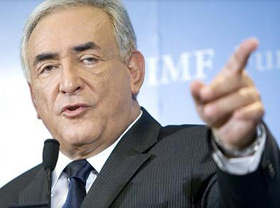
IMF to step up its engagement, support in Central Asia
Speaking with the authorities and members of the public in Kazakhstan, Tajikistan, the Kyrgyz Republic, and the Republic of Uzbekistan, Strauss-Kahn said the Fund is committed to provide continuing technical assistance and financial support to raise the region’s growth potential and help the poorest and most vulnerable groups of the population.
“We are asking governments to rebuild social safety nets to take into account the needs of the poor and most vulnerable groups of the population. We are introducing what I call social conditionality,” said Strauss-Kahn in a public lecture at the Government Academy in Kazakhstan, the first country of his five-day visit to the region.
Sounder banking systems
Growth in Central Asia is expected to drop to only around 1 percent this year, from almost double-digit rates on average during 2005-07, the IMF forecast in its Regional Economic Outlook released in May. The region’s limited exposure to global financial linkages has largely insulated it from the direct impact of the global financial turmoil, with the exception of Kazakhstan, which has a large share of private external financing in the banking sector and is facing difficulties meeting its external debt rollover needs.
In his discussions with the Kazakh authorities, Strauss-Kahn offered to provide IMF technical assistance to support restructuring plans to strengthen banks and restore confidence in the system. “I share the view of the Prime Minister that putting the banking system on a sounder and more sustainable footing will require more reliance on domestic deposits rather than on external financing,” said Strauss-Kahn at the conclusion of his visit to Kazakhstan.
Support to alleviate poverty
In Tajikistan, Strauss-Kahn visited the village of Shainaki Chinor in Rudaki Rayon, where he discussed with migrant workers and nongovernmental organization representatives the impact of the global crisis on the people of Tajikistan though declining remittances and returning migrants.
Over the past decade, Tajikistan and the Kyrgyz Republic have become increasingly reliant on money sent home from citizens working abroad. In 2008, remittances accounted for 47 percent of Tajikistan’s GDP, with most Tajik migrants reportedly working in Russia. With less work available for migrant workers in host countries, some of them are returning to their home countries, contributing to additional pressure on social spending.
The subject of migrant workers was on the agenda at Strauss-Kahn’s meeting with Tajik President Emomali Rahmon. Strauss-Kahn assured President Rahmon that the Fund is committed to provide continuing support to the country; including through the $116 million loan under the concessional Poverty Reduction and Growth Facility approved by the IMF’s Executive Board in April. Strauss-Kahn said the Fund stands ready to step up its support.
Fiscal stimulus
In a public lecture at the State University of the Kyrgyz Republic, Strauss-Kahn commended the Kyrgyz people for their determination to overcome challenges caused by external shocks, including the economic contraction in Kazakhstan and Russia—two key trading partners and sources of remittances.
To that end, Kyrgyz President Kurmanbek Bakiev and Prime Minister Igor Chudinov agreed with Strauss-Kahn that the fiscal stimulus packages in 2009 supported by the donor community are necessary to sustain economic activity and to increase social spending to protect the poor and vulnerable groups of the society.
Strauss-Kahn assured the people and the authorities of the Kyrgyz Republic that the Fund is committed to provide continuing technical assistance and financial support, including through the $102 million arrangement under an Exogenous Shocks Facility, to help manage the effects of the global crisis, raise the country’s growth potential, and alleviate poverty.
“The continuing commitment of the Kyrgyz people to carry out economic reforms is a very important element in the country’s success on the path to prosperity and economic stability,” said Strauss-Kahn in his concluding press statement.
Private sector-led growth
In Uzbekistan, Strauss-Kahn discussed with President Islam Karimov and First Deputy Prime Minister Rustam Azimov the challenges the country faces in its efforts to ensure sustainable and private sector-led growth, including the role of regional cooperation and the longer-term priority for Uzbekistan which is to improve the standards of living of the population.
Strauss-Kahn assured the authorities that the IMF stands ready to support Uzbekistan in its efforts to reduce the impact of the global crisis in the short term, and strengthen the medium-term goal of sustaining higher and broad-based economic growth.
Source: IMF Survey